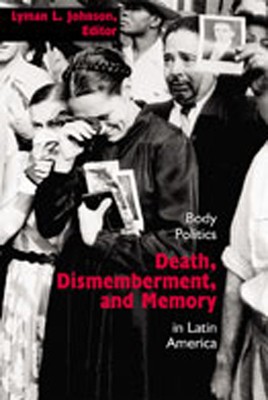
- We will send in 10–14 business days.
- Publisher: University of New Mexico Press
- ISBN-10: 0826332013
- ISBN-13: 9780826332011
- Format: 15.9 x 22.8 x 2.5 cm, softcover
- Language: English
- SAVE -10% with code: EXTRA
Death, Dismemberment, and Memory (e-book) (used book) | bookbook.eu
Reviews
Description
The memories of heroes are preserved the world over in place names, patriotic holidays, printed images on money and stamps, folk songs, roadside shrines, and on web sites. Understanding the origin and meaning of these forms of symbolic political speech is a way to understand cultures and histories. The essays collected here address symbolic political speech associated with the bodies (and body parts) of martyred heroes in Latin America. The authors examine the processes through which these bodies are selected as political vessels, the forms in which they are venerated and memorialized, and the ways they are invested with meaning.
Since colonial times governments and their political enemies in Latin America have struggled to control or appropriate the powerful symbolic powers associated with the bodies of the revered dead. Early examples discussed in this book include Cuauhtémoc, the Aztec ruler executed by Spanish conquistador Hernán Cortés in 1524, and Túpac Amaru, the rebel Inca ruler executed by a Spanish viceroy in Peru in 1572. In both cases the bodies were denied to followers by authorities but were reclaimed symbolically by later generations who found enduring meaning in the sufferings of these martyrs. More recently, the bodies of Evita Perón and Che Guevara were recovered and appropriately reburied by admirers and loyalists. The authors explore the region's mixture of cultures, the legacy of Catholicism, and the persistence of underdevelopment, as they illuminate why the heroic dead in Latin America are likely to speak the language of social protest and resistance to foreign exploiters.
EXTRA 10 % discount with code: EXTRA
The promotion ends in 19d.00:33:10
The discount code is valid when purchasing from 10 €. Discounts do not stack.
- Publisher: University of New Mexico Press
- ISBN-10: 0826332013
- ISBN-13: 9780826332011
- Format: 15.9 x 22.8 x 2.5 cm, softcover
- Language: English English
The memories of heroes are preserved the world over in place names, patriotic holidays, printed images on money and stamps, folk songs, roadside shrines, and on web sites. Understanding the origin and meaning of these forms of symbolic political speech is a way to understand cultures and histories. The essays collected here address symbolic political speech associated with the bodies (and body parts) of martyred heroes in Latin America. The authors examine the processes through which these bodies are selected as political vessels, the forms in which they are venerated and memorialized, and the ways they are invested with meaning.
Since colonial times governments and their political enemies in Latin America have struggled to control or appropriate the powerful symbolic powers associated with the bodies of the revered dead. Early examples discussed in this book include Cuauhtémoc, the Aztec ruler executed by Spanish conquistador Hernán Cortés in 1524, and Túpac Amaru, the rebel Inca ruler executed by a Spanish viceroy in Peru in 1572. In both cases the bodies were denied to followers by authorities but were reclaimed symbolically by later generations who found enduring meaning in the sufferings of these martyrs. More recently, the bodies of Evita Perón and Che Guevara were recovered and appropriately reburied by admirers and loyalists. The authors explore the region's mixture of cultures, the legacy of Catholicism, and the persistence of underdevelopment, as they illuminate why the heroic dead in Latin America are likely to speak the language of social protest and resistance to foreign exploiters.


Reviews